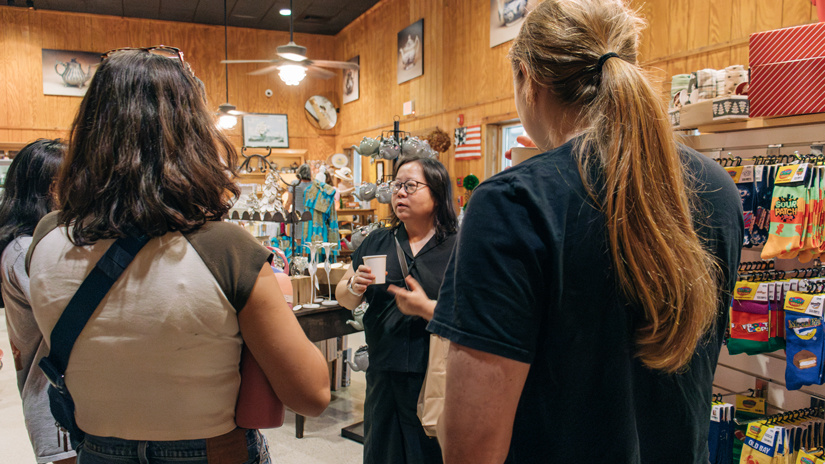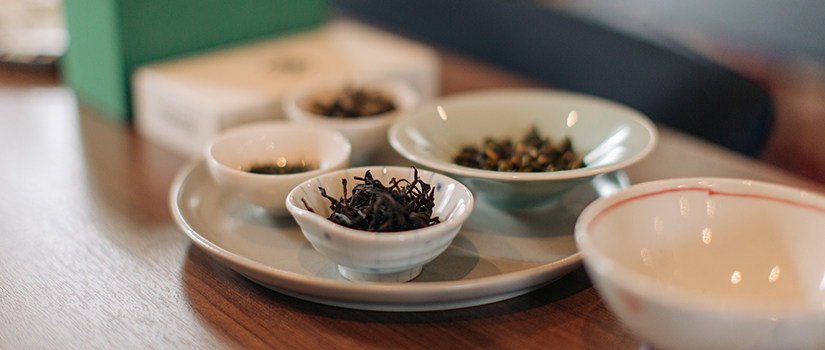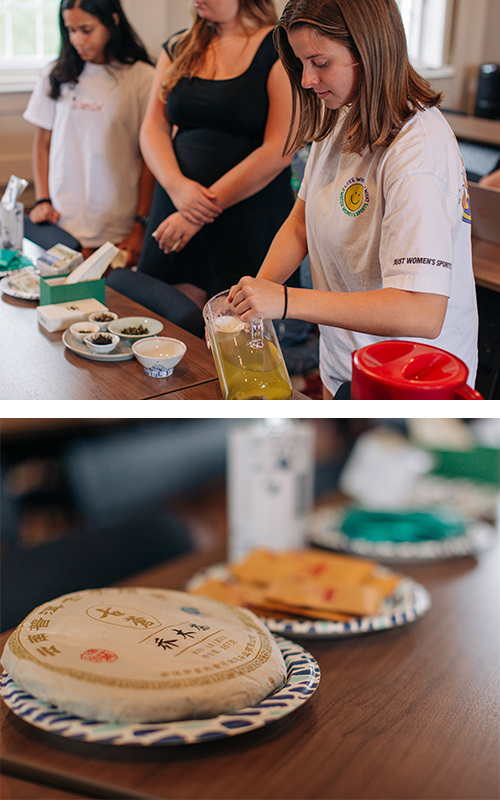
Professor Jie Guo’s Asian American Food Culture classroom can be likened to a banquet. Set before students is a table laden with concepts: globalization, tradition, history and authenticity, the intersection between memory, foodways and community. But what makes this table unique isn’t just its contents, but its empty spaces — spaces where students are expected to place their own contributions.
“I feel I’m just a facilitator for conversations,” says Guo, associate professor of comparative literature. She is insistent that, in a course covering such a large topic, there cannot be only one expert. “I have students come (along) teaching with me.”
This semester, South Carolina Honors College students are investigating rice and tea, two goods that directly or indirectly link Asia, South Carolina and many other countries and cultures. Through a series of readings, documentaries, presentations and immersive experiences, students unravel the global and local histories of rice and tea, approaching what Guo calls a “glocal” — global plus local — perspective.
“I just assigned cookbooks for students to review,” says Guo, “and I told them that every good cookbook has a backstory there. So it's never just about a bunch of recipes. There is always a narrative there, so it's a little bit like literature.”
On the menu
Of course, foods and beverages aren’t just meant to be studied — they must be tasted. This semester, Guo brought an assortment of teas for students to sample: oolong, matcha, pu’er. Appreciating the teas requires students to expand their vocabulary, learning new words for flavors that defy direct translation. During the sampling, Guo guides students through identifying characteristics of tea in both leaf and brewed forms.
“I really enjoyed our tea tasting class experience day,” says Zac Simpson, a senior chemistry major. “Dr. Guo prepared several different types of teas that we had been learning about throughout the week and let us try them. It was really interesting to taste firsthand the different types of tea and know the origin and how they were made.”
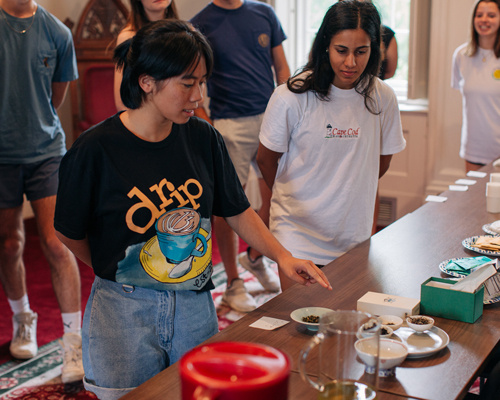
For senior computer science major Katelyn Wyandt, the tea tasting allowed her to build on her personal interests. After a Maymester experience in Japan, Wyandt set off on a travel and tea-collecting adventure through Taiwan and India: “Throughout all of these countries I learned about the importance of tea culture and the travel of Buddhism through these countries, both really interesting to trace through history,” she reflects. Along the way, she collected an assortment of teas to bring home to her mom.
Personal connections form another important component of the class. In addition to readings that Guo selects, she also asks students to make a recommendation, such as a recipe, restaurant, or favorite dish, inviting even more cuisines and traditions to the table. The students also take turns teaching about Asian American history.
“I really enjoy that Dr. Guo lets students present both a personal interest that relates to the class, as well as a chapter from a core reading, The Making of Asian America,” Simpson reflects. “It is really interesting to learn about my classmates' passions as they relate to Asian American food culture, and everything that people have presented on is so unique.”
Simpson presented about his experience cooking Japanese croquettes, korroke, which allowed him to draw from his chemistry studies: “I got to talk about some of these (preparation) steps while presenting, and it helped to be familiar with how the processes worked chemically.”
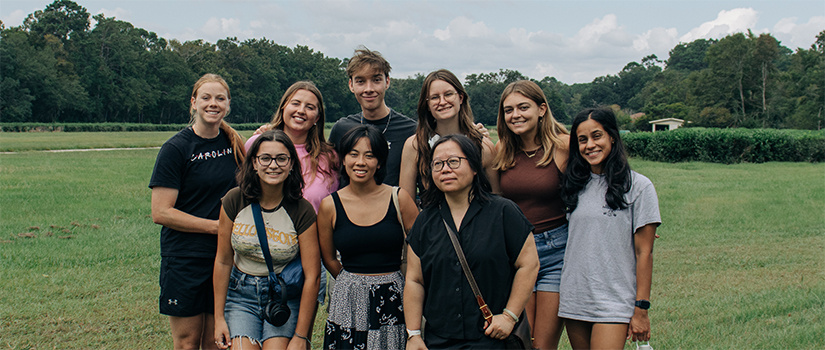
Other hands-on experiences include a day trip to Charleston to visit the Charleston Tea Garden and Charleston Museum, as well as a trip that’s a little closer to campus.
“I also take them to a visit the South Caroliniana library, which has a wonderful collection of historic books,” says Guo, who refers to the librarians there as behind-the-scenes heroes. “So that's another way for them to experience the history of food in South Carolina, by actually being able to be there, to read the actual books, hold the actual cookbooks in (their) hands.”
Steeped in curiosity
Though the course is not a direct connection to Wyandt and Simpson’s majors, they understand the value of taking a class outside of their fields of study.
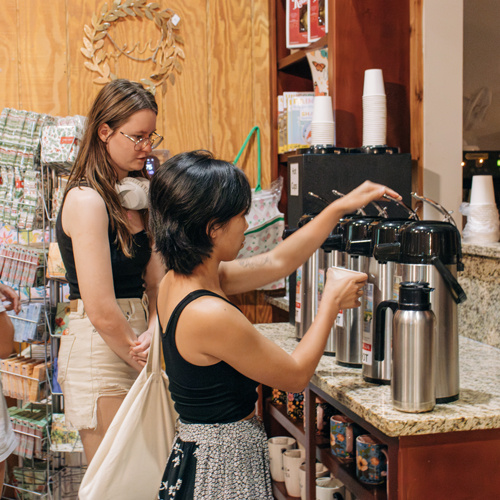
“I think courses like these are an excellent opportunity to see and understand the impact that other cultures have in our everyday lives,” says Simpson. “Since this course focuses on different Asian cultures' adaptation into America, I think it is very easy to apply to the world around, even here in Columbia, which we talk about a lot in this course. Expanding your horizons and familiarizing yourself with other cultures helps lead to more collaboration and an increasingly cohesive society.”
“I think it’s very important for students to take classes that aren't a part of their major or minor because it introduces (them to) a new perspective on the world we are currently living in and also a new demographic of students and teachers that they may have not interacted with on campus,” adds Wyandt. “Dr. Guo's diverse interests and rich travel experiences help to enhance the class because she is able to use a lot of anecdotes to explain the concepts we are studying in class, and we aren't just limited to learning we can find in a textbook.”
In Guo’s opinion, however, the students have just as much to teach her as she has to teach them. The course culminates in a mini-memoir project that asks students to investigate their own relationship with food and the role it has played in their lives, bringing the course’s broader concepts close to home and encouraging students to share the connections they’ve made. At Guo’s banquet table, after all, there’s always room for more.
“It's a sort of oral narrative,” she explains, “with images that they put together. We learn about those huge processes in a globalizing process. On the other hand, I also want them to look at their own family histories, their memories, their family memories and things they cherish.”
